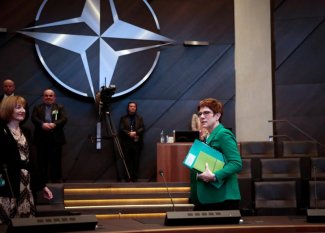Germany’s SPD against nuclear sharing – a challenge for NATO

Since the beginning of May there has been a heated debate in Germany about the country’s participation in NATO’s nuclear sharing program. The discussion began following an interview that Rolf Mützenich, the chairman of the SPD parliamentary group, gave to the Tagesspiegel daily, where he opted for withdrawing US nuclear weapons from Germany and for Germany to withdraw from the NATO arrangements. He argued that nuclear sharing program, which allows for the US B61 nuclear bombs to be carried by the aircraft of European allies, is a relic of the Cold War. Mützenich did not however challenge the need for NATO’s nuclear deterrence and for the US nuclear umbrella over Europe; Germany would continue to actively shape NATO’s policy in the Nuclear Planning Group after withdrawing from the program.
Mützenich was backed in his position by the leaders of the SPD, Saskia Esken and Norbert Walter-Borjans, and opposed by the SPD members who are responsible for foreign policy and security policy in the federal government and the Bundestag, among them Foreign Minister Heiko Maas. On 4th May, the spokesman for the federal government, Steffen Seibert, confirmed Germany’s continued adequate participation in NATO’s nuclear sharing arrangements which he described as an important element of NATO’s credible deterrence. In the binding 2018 coalition agreement it is stipulated that the US nuclear weapons can be withdrawn from Germany only on the condition of a worldwide nuclear disarmament.
Commentary
- The context of the above discussions provided the recent decision made by the defence minister Annegret Kramp-Karrenbauer (CDU) on the new combat aircraft for the German Air Force. It would replace the 40-year-old Tornado fighter jet, which serves (among other functions) as a dual-capable aircraft to carry US nuclear weapons and will be phased out by 2030 at the latest. The German MoD chose 45 Eurofighter aircraft and 45 US F/A-18 jets (30 E/F Super Hornets and 15 EA-18G Growlers) to replace the Tornado fleet. The decision was said to have been consulted with the SPD representatives in the government: Foreign Minister Heiko Maas and Vice Chancellor Olaf Scholz (they are both part of the moderate wing of the party).
- The defence minister’s decision was met with opposition from the left-leaning wing of the SPD which wants to end Germany’s participation in nuclear sharing and to withdraw US nuclear weapons from the country. This SPD faction is beginning to dominate both in the SPD parliamentary group in the Bundestag and within the party, which has been illustrated by recent nominations for important posts. Despite the lack of a new official position on nuclear sharing in the SPD, in the interview Mützenich expressed views which are probably prevalent in the majority of the SPD parliamentary group and the party, thus effectively calling the 2018 coalition agreement into question. The majority of Germans (60–70%) according to surveys conducted in recent years are in favour of withdrawing US nuclear weapons from Germany.
- The shift in the SPD’s position is a factor which might undermine Germany’s participation in NATO’s nuclear sharing in the timeframe of ten years. The decision not to purchase new dual-capable aircraft would mean a gradual pull back from the NATO arrangements. In this term of parliament the SPD might block the preparatory phase of the F/A-18 aircraft procurement which itself is planned only after the next Bundestag elections in 2021. Due to the change of the SPD position the purchase after 2021 might be even more controversial. Should there be a coalition between the CDU/CSU and the Green Party, the procurement is not entirely ruled out; however, it will be made more difficult by deep divisions in the Green Party over its approach to nuclear weapons. The coalition of the Greens, the SPD and the Left Party will most likely lead to the deal not being finalised. The chances of purchasing the new aircraft and extending Germany’s participation in nuclear sharing would be the highest if a less likely coalition between the CDU/CSU and the FDP was formed. Given the above factors, a slow phase-out of Germany’s participation in NATO’s nuclear sharing should not be ruled out due to the gradual withdrawal of the Tornado jets capable of carrying out nuclear strikes from the German Air Force without purchasing a new dual-capable aircraft.
- Germany’s decision to withdraw from the nuclear sharing arrangements would negatively affect European security, including NATO’s eastern flank. From a military point of view, according to some experts, NATO’s nuclear sharing arrangements in their present form are losing importance due to the operational advantages of other (US) nuclear weapons delivery systems. From the political perspective however, nuclear sharing is still important for the credibility of nuclear deterrence in Europe and for NATO’s cohesion. Berlin’s withdrawal from the program together with the withdrawal of US nuclear weapons from Germany would be perceived by Russia as a sign of a serious US-European disengagement. Furthermore, it would be detrimental to US-German politico-military co-operation that is vital for European security and the defence of NATO’s eastern flank. Germany’s withdrawal might lead to similar reactions from other allies participating in the nuclear sharing arrangements, such as Belgium or the Netherlands, whose societies are equally opposed to nuclear weapons. The end of NATO’s nuclear sharing program would end the risk and responsibility sharing between the US and its European allies in nuclear deterrence, a deepening US-European and intra-European rifts over security policy, and a decreased level of nuclear deterrence in Europe. On the other hand, opening a discussion about a reform of NATO’s nuclear sharing on including new allies into the arrangements or deploying new US systems in Europe might deepen the already existing divides among the allies.





